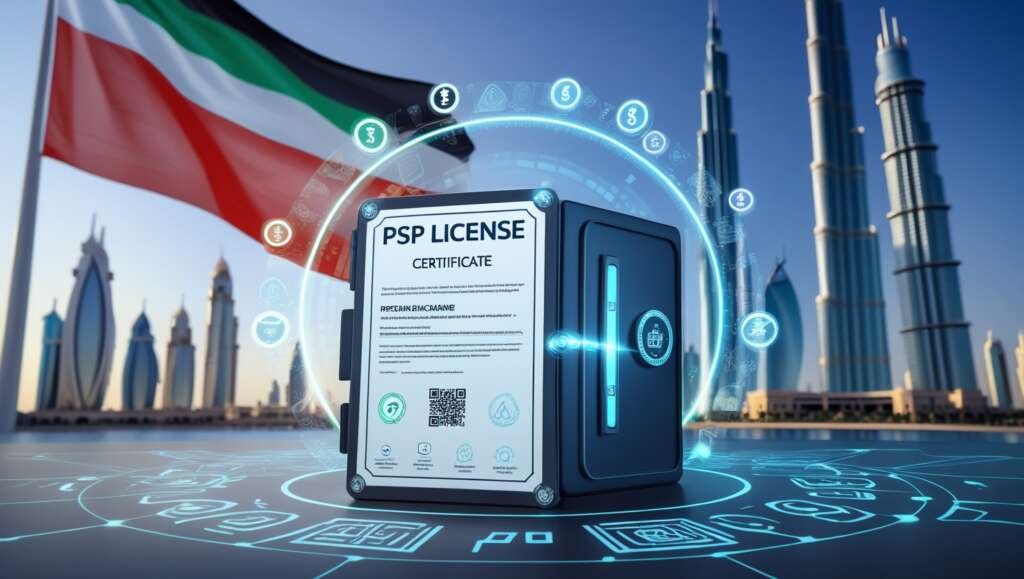The United Arab Emirates, with its ambitious digital transformation agenda and burgeoning FinTech sector, has crafted a robust regulatory framework for payment services. At the core of this framework is the Payment Service Provider (PSP) License, mandated by the Central Bank of the UAE (CBUAE) under its comprehensive Retail Payment Services and Card Schemes Regulation. This licensing regime serves as a critical mechanism to ensure the safety, soundness, efficiency, and integrity of payment operations, thereby fostering public confidence in digital transactions.
For entities seeking to operate within this vital segment of the financial industry, obtaining a CBUAE PSP License is an indispensable step. It signifies regulatory endorsement, a commitment to stringent compliance, and the ability to contribute to the nation’s secure and evolving payment infrastructure.
The Mandate and Purpose of PSP Licensing
The CBUAE’s authority to license and oversee PSPs stems from its broader mandate to maintain financial stability and protect consumers. The core objectives behind the PSP licensing framework include:
- Ensuring Financial Integrity: Guaranteeing that all payment transactions are processed securely, free from fraud, and compliant with Anti-Money Laundering (AML) and Counter-Terrorism Financing (CFT) regulations.
- Promoting Market Confidence: Instilling trust among consumers and businesses that digital payment services are reliable, efficient, and adequately safeguarded.
- Fostering Innovation within a Regulated Environment: Encouraging the development of new payment solutions while simultaneously ensuring that technological advancements do not introduce undue systemic risks.
- Consumer Protection: Establishing clear rights and obligations for both PSPs and their users, ensuring transparent operations and effective redress mechanisms.
- Systemic Stability: Integrating PSPs into the regulated financial system to mitigate potential risks that could affect the broader economy.
Without the requisite license from the CBUAE, no entity may legally offer retail payment services within the UAE. Non-compliance can lead to severe penalties, including fines, operational cessation orders, and reputational damage.
Categories of PSP Licenses: Tailored Authorizations
The CBUAE’s Retail Payment Services and Card Schemes Regulation introduces a structured approach to licensing, categorizing PSPs based on the scope and nature of the retail payment services they intend to provide. This tiered approach allows for proportionate regulation, ensuring that the licensing conditions and capital requirements are commensurate with the risks associated with the specific activities undertaken. While the exact categorizations and their associated requirements are detailed in the CBUAE’s official regulations, common service types that fall under the licensing regime include:
- Payment Account Issuance Services: Offering accounts that hold funds for payment transactions (e.g., digital wallets).
- Payment Instrument Issuance Services: Issuing instruments like debit cards or prepaid cards that enable payment transactions.
- Merchant Acquiring Services: Providing services to merchants to accept electronic payments (e.g., POS terminals, online gateways).
- Payment Aggregation Services: Consolidating payment transactions from multiple merchants to a single acquiring bank.
- Domestic and Cross-border Fund Transfer Services: Facilitating money transfers within the UAE or internationally.
- Payment Token Services: Providing services related to payment tokens, which are a type of crypto-asset backed by one or more fiat currencies (often referred to as stablecoins or e-money tokens). This specific category highlights the CBUAE’s progressive stance on regulating digital assets within the payment ecosystem.
- Payment Initiation Services: Initiating a payment order from a user’s account with their consent, without necessarily holding the funds.
- Payment Account Information Services: Accessing and providing consolidated information on a user’s payment accounts held with different institutions, with user consent.
Each license category will permit a prescribed combination of these services, with differing initial capital requirements ranging, for instance, from AED 100,000 for certain lower-risk activities to AED 3 million or more for more comprehensive service offerings. It is crucial for prospective PSPs to meticulously define their business model and the exact services they intend to provide to determine the appropriate license category.
Eligibility Criteria: The Gateway Requirements
To successfully obtain a PSP License, applicants must satisfy a rigorous set of eligibility criteria that span legal, financial, operational, and compliance dimensions. These requirements underscore the CBUAE’s commitment to admitting only well-prepared and reputable entities into its regulated payment landscape. Key criteria typically include:
- Legal Entity Requirements: The applicant must be a legally registered entity in the UAE. Companies generally have the option to incorporate in Mainland UAE (requiring a local sponsor/agent) or within one of the financial Free Zones, such as the Dubai International Financial Centre (DIFC) regulated by the DFSA, or the Abu Dhabi Global Market (ADGM) regulated by the FSRA. Each jurisdiction offers distinct advantages, such as 100% foreign ownership in Free Zones, but also has its own specific set of licensing requirements from its respective Free Zone authority in addition to CBUAE’s overarching mandates.
- Minimum Capital Requirements: PSPs are required to meet and maintain specific minimum paid-up capital thresholds, which vary based on the license category and the nature and volume of services provided. These financial requirements are critical for ensuring the PSP’s financial stability and its capacity to absorb potential losses. The CBUAE may also impose higher aggregate capital fund requirements if it deems it necessary to ensure ongoing soundness, especially if a PSP’s transaction value exceeds certain thresholds for consecutive months (e.g., AED 10 million for three consecutive months).
- Comprehensive Business Plan: A detailed and robust business plan is mandatory. This plan must articulate the PSP’s business goals, target market, operational strategies, technological infrastructure, risk management protocols, and clear financial projections (typically for 3-5 years). It serves as a blueprint demonstrating the viability and sustainability of the proposed payment services.
- Corporate Governance Arrangements: PSPs must establish and maintain effective, robust, and well-documented corporate governance arrangements. This includes a clear organizational structure with well-defined, transparent, and consistent lines of responsibility, encompassing the Board of Directors, senior management, and all key operational functions. The CBUAE expects strong oversight, internal controls, and ethical leadership.
- Qualified Personnel (“Fit and Proper”): The appointment of key personnel, including the Board of Directors, senior management, compliance officers, and IT security personnel, is subject to a “fit and proper” assessment by the CBUAE. This evaluation scrutinizes their qualifications, relevant experience, financial integrity, and professional background to ensure they possess the necessary competence and integrity to fulfill their roles effectively.
- Technology and Cybersecurity Infrastructure: PSPs must possess a secure and resilient IT infrastructure. This includes robust data encryption, advanced fraud detection systems, comprehensive cybersecurity frameworks, secure payment gateways, and stringent data protection policies aligned with international standards and UAE Information Assurance Standards.
- AML/CFT Compliance Framework: An exhaustive Anti-Money Laundering (AML) and Counter-Terrorism Financing (CFT) compliance framework is non-negotiable. This involves developing a risk-based AML program, implementing robust Customer Due Diligence (CDD) and Enhanced Due Diligence (EDD) processes, sophisticated transaction monitoring systems, and clear procedures for reporting suspicious activities to the UAE Financial Intelligence Unit (FIU).
- Risk Management Policies: PSPs must establish and maintain comprehensive and effective policies and procedures to identify, manage, monitor, and report all risks arising from their retail payment services. These policies must be kept up-to-date, reviewed annually, and proportionate to the nature, scale, and complexity of services provided.
- Accounting and Audit: PSPs are required to appoint an independent auditor on an annual basis. The auditor is mandated to audit the financial statements and, crucially, separately audit the systems and controls of the Retail Payment Services provided, ensuring transparency and accountability.
The Application Process: A Structured Journey
Obtaining a PSP License from the CBUAE is a multi-stage process that demands meticulous preparation and proactive engagement with the regulator. While specific steps may vary slightly based on the license category and the CBUAE’s current guidelines, the general trajectory includes:
- Preliminary Engagement & Business Model Definition: Prospective PSPs should thoroughly define their business model, the specific payment services they intend to offer, and identify their target market. A preliminary consultation with legal and regulatory advisors experienced in UAE financial licensing is highly recommended to understand the regulatory nuances and confirm the appropriate license category.
- Legal Entity Incorporation: Establish the legal entity in the chosen jurisdiction (mainland or free zone). This involves company registration with the relevant economic department (e.g., DED for Dubai Mainland) or free zone authority.
- Documentation Compilation: Prepare a comprehensive application package. This typically includes the detailed business plan, corporate incorporation documents (Memorandum of Association, Articles of Association), certified report on paid-up capital, ownership structure, detailed information on all key personnel (CVs, fit and proper declarations), AML/KYC policies and procedures, IT security frameworks, fraud detection policies, risk management policies, and financial projections.
- Application Submission to CBUAE: The compiled application, along with the prescribed application fees, is formally submitted to the CBUAE’s Licensing Division.
- Regulatory Review and Due Diligence: The CBUAE undertakes a rigorous review of the application. This phase involves extensive due diligence on the applicant entity, its shareholders, directors, and key management. The CBUAE may request additional information, clarifications, or conduct interviews with key personnel. This stage also involves a detailed assessment of the proposed AML/CFT framework and the technology and cybersecurity infrastructure.
- Pre-Licensing Inspections/Audits: In some cases, the CBUAE may conduct on-site inspections or request independent third-party audits of the applicant’s systems and controls to verify compliance readiness.
- Final Approval and Issuance: Upon satisfactory review and fulfillment of all requirements, the CBUAE grants the PSP License. This license is typically valid for a period of five years, subject to ongoing compliance.
Post-Licensing Obligations: Continuous Compliance
Obtaining the PSP License is not the final destination but the commencement of an ongoing commitment to regulatory compliance. Licensed PSPs are subject to continuous supervision by the CBUAE, which includes:
- Ongoing Regulatory Compliance: Adherence to all CBUAE regulations, including those related to AML/CFT, consumer protection, data privacy, and technology risk.
- Regular Reporting: Submission of periodic financial reports (quarterly, annually), operational data, compliance reports, and any other information as required by the CBUAE.
- Audits and Inspections: Undergoing routine regulatory authority compliance checks, external financial audits, and independent systems and controls audits.
- Incident Reporting: Immediate notification to the CBUAE of any significant operational incidents, cybersecurity breaches, legal actions, or events that could disrupt services or impact the PSP’s financial health.
- Maintaining Minimum Capital: Continuously meeting the prescribed initial and aggregate capital requirements.
- Compliance with UAE Information Assurance Standards: Ensuring continuous adherence to these crucial cybersecurity standards.
The Strategic Advantage of a UAE PSP License
For businesses, securing a PSP License in the UAE offers significant strategic advantages:
- Legitimacy and Trust: Operating under a CBUAE license confers a high degree of credibility and trust, essential in a sensitive industry.
- Access to a Robust Market: The UAE boasts a sophisticated financial infrastructure, a tech-savvy population, and a rapidly growing digital economy, offering vast opportunities for payment service providers.
- Gateway to Regional and Global Markets: A UAE license often serves as a strong credential for expanding into other markets within the GCC and beyond, facilitating cross-border operations and international partnerships.
- Integration with Advanced Infrastructure: Licensed PSPs gain access to advanced banking infrastructure and may integrate with key national payment systems.
- Talent Pool and Business Environment: The UAE offers a diverse and skilled talent pool, alongside a supportive business environment, including tax efficiencies in Free Zones.
A Commitment to Excellence
The journey to obtaining and maintaining a Payment Service Provider License in the UAE is a testament to an entity’s commitment to excellence, security, and integrity. It demands a rigorous approach to governance, risk management, technology, and compliance. However, by navigating this path successfully, PSPs not only fulfill their regulatory obligations but also position themselves as integral, trusted partners in the UAE’s vibrant and continually evolving digital financial landscape, contributing to its vision as a global FinTech hub.




